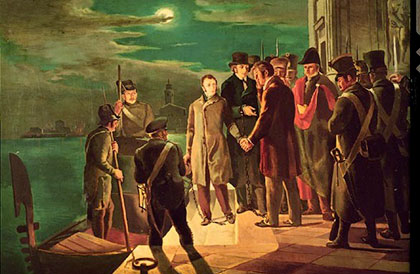
[ABOVE—“Arrest of Silvio Pellico and Piero Maroncelli” by Carlo Felice Biscarra (1823–1894) [Public domain], via Wikimedia Commons File:Arresto di Silvio Pellico e Piero Maroncelli – Carlo Felice Biscarra.jpg]
For supporting an organization called the “Charcoal Burners” (the Carbonari) which conspired to bring revolution to Naples, Pellico was arrested by the Austrians and thrown into prison. Austria had decreed death to anyone who belonged to a secret organization and severe punishment to supporters; Pellico did not know whether he would be jailed or executed. As it turned out he was jailed.
History of Christianity is a six part survey designed to stimulate your curiosity by providing glimpses of pivotal events and persons in the spread of the church.
He would write a moving account of his experiences, under the title, My Prisons (Le Mie Prigioni). The following is chapter 3 from a translation titled My Ten Years’ Imprisonment.
My Prisons, Chapter 3
To awake the first night in a prison is a horrible thing. Is it possible, I murmured, trying to collect my thoughts, is it possible I am here? Is not all that passed a dream? Did they really seize me yesterday? Was it I whom they examined from morning till night, who am doomed to the same process day after day, and who wept so bitterly last night when I thought of my dear parents? Slumber, the unbroken silence, and rest had, in restoring my mental powers, added incalculably to the capability of reflecting, and, consequently, of grief. There was nothing to distract my attention; my fancy grew busy with absent forms, and pictured, to my eye the pain and terror of my father and mother, and of all dear to me, on first hearing the tidings of my arrest.
At this moment, said I, they are sleeping in peace; or perhaps, anxiety for me may keep them watching, yet little anticipating the fate to which I am here consigned. Happy for them, were it the will of God, that they should cease to exist ere they hear of this horrible misfortune. Who will give them strength to bear it? Some inward voice seemed to whisper me, He whom the afflicted look up to, love and acknowledge in their hearts; who enabled a mother to follow her son to the mount of Golgotha, and to stand under His cross. He, the friend of the unhappy, the friend of man.
Strange this should be the first time I truly felt the power of religion in my heart; and to filial love did I owe this consolation. Though not ill-disposed, I had hitherto been little impressed with its truth, and had not well adhered to it. All common-place objections I estimated at their just value, yet there were many doubts and sophisms which had shaken my faith. It was long, indeed, since they had ceased to trouble my belief in the existence of the Deity; and persuaded of this, it followed necessarily, as part of His eternal justice, that there must be another life for man who suffers so unjustly here. Hence, I argued, the sovereign reason in man for aspiring to the possession of that second life; and hence, too, a worship founded on the love of God, and of his neighbour, and an unceasing impulse to dignify his nature by generous sacrifices. I had already made myself familiar with this doctrine, and I now repeated, “And what else is Christianity but this constant ambition to elevate and dignify our nature?” and I was astonished, when I reflected how pure, how philosophical, and how invulnerable the essence of Christianity manifested itself, that there could come an epoch when philosophy dared to assert, “From this time forth I will stand instead of a religion like this.” And in what manner—by inculcating vice? Certainly not. By teaching virtue? Why that will be to teach us to love God and our neighbor; and that is precisely what Christianity has already done, on far higher and purer motives. Yet, notwithstanding such had, for years, been my opinion, I had failed to draw the conclusion, Then be a Christian! No longer let corruption and abuses, the work of man, deter you; no longer make stumbling-blocks of little points of doctrine, since the principal point, made thus irresistibly clear, is to love God and your neighbor.
In prison I finally determined to admit this conclusion, and I admitted it. The fear, indeed, of appearing to others more religious than I had before been, and to yield more to misfortune than to conviction, made me sometimes hesitate; but feeling that I had done no wrong, I felt no debasement, and cared nothing to encounter the possible reproaches I had not deserved, resolving henceforward to declare myself openly a Christian.

